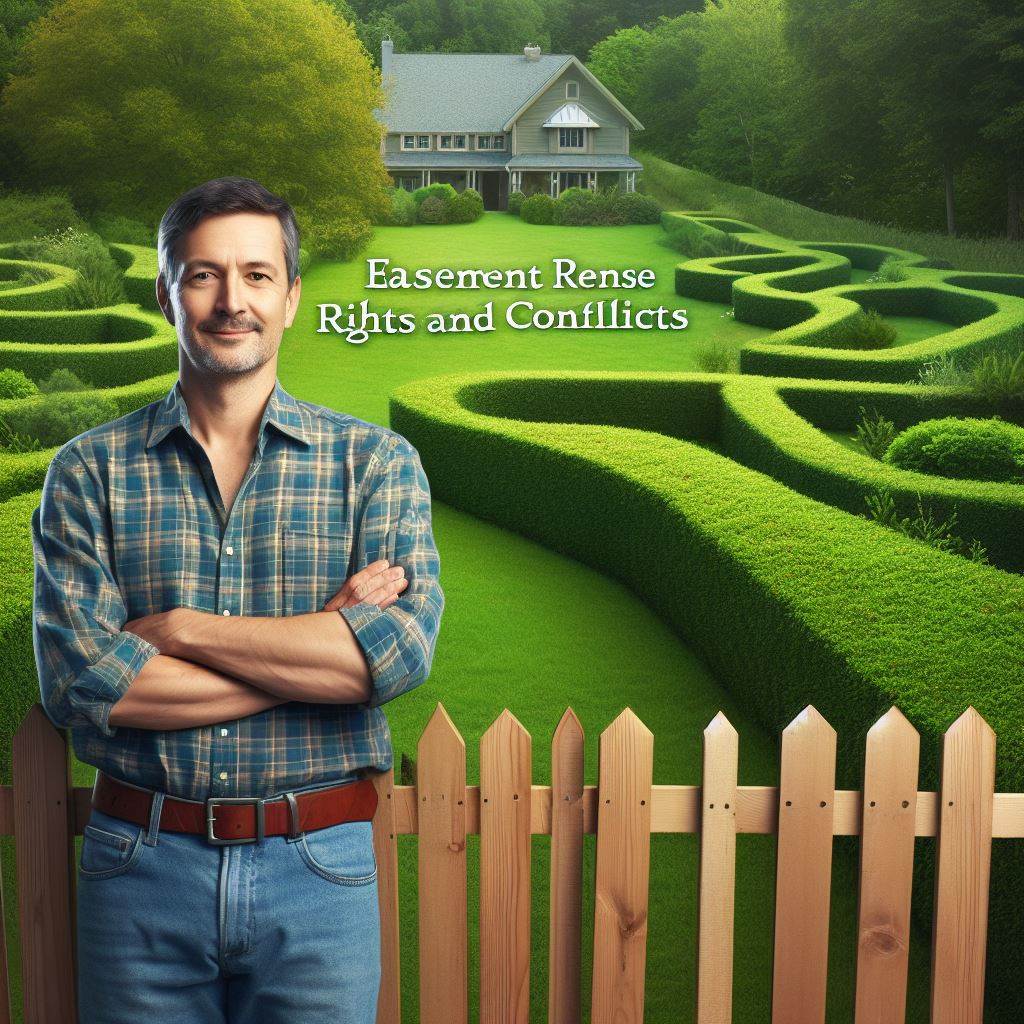Introduction
Property line disputes can greatly impact real estate ownership and usage, making it crucial to navigate them effectively.
These disputes occur when the boundaries of adjacent properties are contested, leading to conflicts over ownership rights and land usage.
Resolving property line disputes is vital to ensure peaceful coexistence and avoid legal complications.
Understanding the challenges faced by property owners during these disputes is essential.
One common challenge is the difficulty of accurately determining property boundaries, especially in cases where no official survey was conducted.
Additionally, disagreements can arise due to differing interpretations of historical documents, old maps, or verbal agreements.
Such disputes often result in emotional stress, financial burdens, and strained relationships between property owners.
These challenges are further complicated by the legal complexities involved in property line disputes.
Laws governing property ownership and boundaries vary from jurisdiction to jurisdiction, which can lead to confusion and delays in resolving disputes.
Moreover, the high costs associated with legal proceedings and expert opinions often discourage property owners from pursuing resolution through the court system.
In the following sections, we will discuss key strategies for effectively navigating property line disputes.
By employing these strategies, property owners can foster a fair and amicable resolution, preserving their rights and maintaining harmonious relationships with their neighbors.
Let’s explore the best practices for successfully resolving property line disputes and ensuring a satisfactory outcome for all parties involved.
Understanding Property Boundaries
Define and explain property boundaries, including physical markers and legal descriptions.
Property boundaries are the lines that define the extent of a piece of land or property.
They can be established through physical markers such as fences, walls, or hedges.
Legal descriptions are also used to determine property boundaries, including metes and bounds, lot and block numbers, or GPS coordinates.
Accurate property surveys are crucial in determining property boundaries.
A professional surveyor can physically measure and map out the exact boundaries of a property.
This survey will provide a precise understanding of the property’s limits.
Without a proper property survey, disputes and conflicts between neighboring property owners can arise.
Disagreements over boundaries can lead to legal battles and unnecessary stress.
The significance of accurate property surveys for determining boundaries.
Having accurate property surveys can help prevent such disputes from occurring in the first place.
Property surveys are reliable legal evidence in case of any disagreements regarding property boundaries.
They can help settle disputes and provide clarity to all parties involved.
When purchasing a property, it is essential to obtain an up-to-date property survey.
This survey will ensure that the buyer knows exactly what they are acquiring and the limits of their property.
Even if property boundaries seem apparent, it is still advised to get a survey done.
Markers like fences can deteriorate or be moved, causing confusion about the actual boundaries.
A property survey can help avoid future conflicts with neighbors over boundary issues.
When it comes to property line disputes, it is best to address them as soon as they arise.
Ignoring the issue or waiting too long can make it more challenging to resolve down the line.
Communicating with your neighbor and discussing the dispute may lead to an amicable solution.
If a resolution cannot be reached through discussion, consulting a professional mediator or attorney might be necessary.
Familiarizing oneself with local laws regarding property boundaries is also crucial.
Each jurisdiction may have specific regulations and requirements for resolving property line disputes.
Understanding these laws will empower landowners to protect their rights and interests.
In fact, property boundaries are critical for maintaining peaceful coexistence between neighbors.
Accurate property surveys provide clear and irrefutable evidence of these boundaries.
Property owners should take proactive measures to ensure they understand their property limits and avoid disputes.
By seeking professional surveys and being knowledgeable about local laws, property line conflicts can be minimized.
Read: The Importance of HOA Reserve Funds
Identifying Signs of a Property Line Dispute
Common indicators that a property line dispute may exist, such as encroachments, conflicting surveys, or disagreements with neighbors
Property line disputes can be a homeowner’s nightmare, leading to legal battles, strained relationships with neighbors, and unexpected costs.
Early detection of potential disputes is crucial for preventing these complications.
Here, we’ll explore common indicators that a property line dispute may exist and the importance of spotting them early on.
Encroachments are one of the most obvious signs of a property line dispute.
This occurs when a neighbor’s structure, such as a fence, driveway, or building, crosses over onto your property.
Even seemingly minor encroachments can escalate into major disputes if left unresolved.
Conflicting surveys can also signal trouble.
If different surveys show conflicting boundary lines, it’s essential to address the discrepancy promptly.
Discrepancies may arise due to outdated surveys, measurement errors, or changes in property lines over time.
Disagreements with neighbors over property boundaries are another red flag.
Whether it’s a dispute over where a fence should be placed or who is responsible for maintaining a shared boundary, these disagreements often hint at underlying property line issues that need to be addressed.
The importance of early detection in order to prevent potential legal complications
Early detection of property line disputes is crucial for several reasons.
Firstly, resolving disputes early can prevent them from escalating into costly legal battles.
By addressing the issue promptly, homeowners can often reach amicable solutions through negotiation or mediation, saving time and money in the long run.
Additionally, early detection can help homeowners avoid unwittingly forfeiting their property rights.
In some cases, failing to assert one’s property rights promptly can result in adverse possession, where a neighbor gains legal ownership of a portion of the property through continuous use over time.
By addressing property line disputes early, homeowners can protect their rights and prevent adverse possession claims.
Furthermore, early detection allows homeowners to take proactive steps to clarify and establish their property boundaries.
This may involve commissioning a new survey, updating property deeds, or installing boundary markers to clearly demarcate the boundary lines.
In essence, identifying signs of a property line dispute early on is essential for preventing legal complications, protecting property rights, and maintaining positive relationships with neighbors.
By being vigilant for signs of encroachments, conflicting surveys, or disagreements with neighbors, homeowners can address property line issues promptly and effectively.
Read: Estate Planning for Rental Property Owners
Gathering Evidence and Documentation
Gathering evidence and documentation is crucial when navigating property line disputes.
It is important for readers to collect relevant documents, such as property deeds, survey reports, and any relevant photographs or videos.
When faced with a property line dispute, it is essential to gather as much evidence and documentation as possible to support your case.
This evidence will provide credibility and strength to your arguments and help you protect your property rights.
Advise readers to collect relevant documents
One of the first steps in gathering evidence is to advise readers to collect relevant documents.
These documents may include property deeds, survey reports, and any other legal documents that show the exact boundaries of their property.
These documents serve as proof of ownership and can help establish the correct property lines.
Recommend keeping records of communication
In addition to collecting official documents, it is recommended to keep records of any communication with neighbors or other parties involved in the dispute.
This includes written correspondence, emails, or even recorded conversations.
These records can be crucial in proving any agreements, disagreements, or statements made by the opposing party.
When keeping records of communication, it is important to be thorough and organized.
Make sure to document the date, time, and content of each interaction.
This will help establish a timeline of events and strengthen your case.
For any written communication, it is advisable to send letters or emails via certified mail or with delivery confirmation.
This ensures that there is proof of receipt and avoids any dispute regarding whether the recipient received the correspondence.
It is also important to be mindful of any potential witnesses who can provide testimony in your favor.
Keep a record of witnesses’ names, contact information, and a brief description of their potential testimony.
Witness testimony can be powerful evidence in property line disputes.
Furthermore, it is worth considering obtaining expert opinions or hiring professionals who can provide technical assessments of the dispute.
These professionals may include land surveyors, property appraisers, or lawyers specializing in property law.
Their expert opinions and assessments can carry significant weight in resolving the dispute.
In a nutshell, when navigating property line disputes, gathering evidence and documentation is a crucial strategy.
It is essential to advise readers to collect relevant documents, such as property deeds and survey reports.
Additionally, recommending the keeping of records of communication with neighbors or other involved parties will strengthen their case.
By taking these key strategies, individuals can protect their property rights and effectively resolve property line disputes.
Read: Common HOA Violations and Penalties
Seeking Legal Assistance
Property line disputes can quickly become complex and emotionally charged affairs, often requiring legal intervention to reach a resolution.
Whether it’s a disagreement over boundaries, easements, or encroachments, seeking legal assistance is often the most prudent course of action.
Here’s why, and how, to find the right real estate attorney to help you navigate these choppy waters.
Understanding the Complexity
Property line disputes can arise due to a variety of reasons, including unclear boundary descriptions, conflicting surveys, adverse possession claims, or even neighborly disagreements.
Resolving these disputes requires a nuanced understanding of property law, surveying techniques, and potentially even mediation or litigation skills.
Attempting to tackle these issues alone can lead to costly mistakes, prolonged conflicts, and even damage to neighborly relationships. That’s where seeking legal assistance becomes invaluable.
Finding an Experienced Real Estate Attorney
When seeking legal assistance for a property line dispute, it’s crucial to find an attorney with expertise in real estate law and a track record of successfully handling similar cases. Here are some steps to guide your search:
- Research: Start by researching attorneys or law firms in your area that specialize in real estate law and have experience with property line disputes. Look for reviews, testimonials, and case histories to gauge their proficiency.
- Consultations: Schedule consultations with a few attorneys to discuss your case. During these meetings, inquire about their experience with property disputes, their approach to handling such cases, and their success rate. It’s also an opportunity to assess their communication style and compatibility with your needs.
- Ask for Referrals: Seek recommendations from trusted sources such as friends, family, or other professionals in the real estate industry. Personal referrals can provide valuable insights into an attorney’s reputation and capabilities.
- Credentials and Specializations: Verify the attorney’s credentials, including their education, licensing, and any specialized certifications related to real estate law or property disputes.
- Fee Structure: Discuss the attorney’s fee structure upfront to ensure transparency and avoid any surprises later on. Some attorneys may offer alternative fee arrangements, such as flat fees or contingency fees, depending on the specifics of your case.
By enlisting the expertise of a qualified real estate attorney, you can navigate property line disputes with confidence, knowing that your rights and interests are being protected.
Don’t hesitate to seek legal assistance when faced with such challenges – it could make all the difference in achieving a favorable resolution.
Read: Condo Living: Rights and Responsibilities

Mediation and Alternative Dispute Resolution
The benefits of mediation in resolving property line disputes amicably and cost-effectively
In property line disputes, mediation and alternative dispute resolution can offer valuable benefits.
Mediation helps resolve conflicts amicably and cost-effectively.
One major advantage of mediation is that it promotes a cooperative atmosphere, encouraging both parties to reach a mutually beneficial agreement.
Unlike a courtroom setting, mediation allows for open communication and collaboration.
Another benefit of mediation is its cost-effectiveness.
Litigation can be costly, with legal fees, court expenses, and potential expert witness fees.
Mediation avoids these expenses, making it a more affordable option for resolving property line disputes.
The role and qualifications of a mediator and how they can help facilitate negotiations
A qualified mediator plays a crucial role in facilitating negotiations.
The mediator is a neutral third party who helps guide the parties toward a resolution.
They do not take sides or provide legal advice but rather assist in finding common ground.
To effectively mediate property line disputes, a mediator should possess specific qualifications.
They should have a thorough understanding of property laws and regulations to provide informed guidance.
Mediators should also have excellent communication and negotiation skills.
During the mediation process, the mediator creates a structured and controlled environment for discussions.
They set ground rules, ensuring respectful and productive communication between the parties involved. This approach helps prevent further escalation of the dispute.
The mediator encourages each party to present their perspectives, concerns, and proposed solutions.
They promote active listening and ensure that everyone has a fair chance to express their viewpoints.
Through this process, the mediator helps identify common interests and potential areas of agreement.
Once common ground is identified, the mediator helps the parties explore possible solutions.
They guide the discussion, encouraging creative problem-solving and brainstorming.
Together, they evaluate various options and work towards a mutually acceptable resolution.
If an agreement is reached, the mediator helps draft a settlement agreement that outlines the terms and conditions.
This document, when signed by both parties, becomes legally binding. It provides a clear understanding of the resolution and helps prevent future disputes.
In cases where an agreement cannot be reached through mediation, the parties are still free to pursue litigation.
However, mediation often encourages parties to find common ground, avoiding the lengthy and expensive court process.
Therefore, mediation offers several benefits in resolving property line disputes.
It promotes a cooperative atmosphere, reduces costs, and allows parties to actively participate in finding a resolution.
A qualified mediator plays a crucial role in facilitating negotiations and guiding the parties towards a mutually beneficial agreement.
The Litigation Process
When it comes to property line disputes, sometimes litigation becomes the only option for resolution.
Understanding the process involved in filing a lawsuit for such disputes is crucial.
In this section, we will outline the necessary steps to take, discuss associated costs and timeframes, as well as caution readers about the potential risks of going to court.
Filing a Lawsuit: Step-by-Step Guide
Step 1: Consultation with an Attorney
Begin by seeking legal advice from a reputable attorney specializing in property law.
They will guide you through the entire process and provide personalized recommendations based on your unique situation.
Step 2: Gathering Evidence
Collect all necessary documentation that supports your claim, such as property surveys, deeds, photographs, and any written communication regarding the dispute.
This evidence will be crucial in building your case.
Step 3: Drafting the Complaint
Your attorney will help you prepare a complaint that clearly outlines your grievances, identifies the parties involved, and details the relief you are seeking (e.g., specific performance, damages, or injunctive relief).
Step 4: Filing the Complaint
Once the complaint is finalized, it needs to be filed with the appropriate court.
Your attorney will ensure all necessary forms and fees are submitted correctly and within the specified timeframe.
Step 5: Serving the Defendant
After filing, the defendant must be officially served with a copy of the complaint, usually by a process server or sheriff.
Proper service is crucial to ensure the defendant’s right to respond.
Step 6: The Defendant Responds
Once served, the defendant typically has a specific amount of time to respond to the complaint.
They may admit or deny the allegations, and in some cases, file counterclaims against you.
Step 7: Preparing for Trial
If the dispute cannot be resolved through negotiation or alternative dispute resolution methods, the case will proceed towards trial.
Both parties will engage in extensive preparations, including gathering evidence, interviewing witnesses, and formulating legal arguments.
Step 8: The Trial
During the trial, both sides present their evidence, arguments, and witnesses.
The judge or jury will evaluate the case and make a final decision on the property line dispute based on the presented facts and applicable laws.
Step 9: Post-Trial Proceedings
Depending on the trial outcome, either party may choose to pursue additional legal actions, such as appealing the decision or seeking enforcement of the judgment. These proceedings can further prolong the resolution process.
Costs and Timeframes of Litigation
It’s important to be aware that litigation can be a lengthy and expensive process.
The costs associated with property line dispute lawsuits can vary significantly depending on factors such as attorney fees, court fees, expert witness fees, and discovery expenses.
Moreover, the timeframe for resolving property line disputes through litigation can stretch from months to even several years, depending on the complexity of the case, court availability, and the willingness of both parties to reach a settlement.
Risks and Uncertainties
While litigation can offer a resolution, it also carries inherent risks and uncertainties.
- Unpredictable outcomes: The court’s decision may not align with your expectations, and there is always the possibility of an unfavorable ruling.
- Financial implications: Legal fees can accumulate rapidly throughout the litigation process, and there is no guarantee of recovering these costs even if you win the case.
- Strained relationships: Litigation can escalate tensions between parties, potentially damaging any future prospects for amicable resolution or neighborly relations.
Ultimately, it is crucial to carefully consider the potential risks and uncertainties before deciding to pursue litigation.
Exploring alternative dispute resolution methods such as mediation or arbitration is often advisable to mitigate these risks and reach an agreement outside the courtroom.
To conclude, understanding the litigation process for property line disputes is essential to navigate these complex legal matters effectively.
By consulting with an attorney, gathering evidence, and being aware of the costs and timeframes involved, you can make informed decisions and assess the potential risks before initiating a lawsuit.
Considerations for Preserving Relationships
Navigating property line disputes can often be a stressful and contentious process.
However, amidst the legal intricacies and boundary disagreements, it’s crucial to remember the value of maintaining positive relationships with your neighbors.
Here, we’ll delve into key strategies for approaching property line disputes with a focus on preserving these vital connections.
Encouragement for readers to approach property line disputes with a focus on maintaining good neighborly relations
First and foremost, fostering open and respectful communication is paramount.
Rather than immediately resorting to legal action or confrontational tactics, consider initiating a conversation with your neighbor to discuss the issue calmly and rationally.
Approach the discussion with empathy and a willingness to listen to their perspective.
By demonstrating understanding and mutual respect, you can lay the foundation for a constructive dialogue aimed at finding a mutually beneficial solution.
During these discussions, it’s essential to remain patient and diplomatic, even in the face of disagreement.
Avoid assigning blame or making accusations, as this can escalate tensions and strain relationships further.
Instead, focus on articulating your concerns clearly and objectively, while also being receptive to your neighbor’s input.
By fostering an atmosphere of cooperation and understanding, you can increase the likelihood of reaching a resolution that satisfies both parties.
In addition to verbal communication, consider documenting your discussions and any agreements reached in writing.
This can help prevent misunderstandings and provide clarity on the proposed solutions. Be sure to involve any relevant professionals, such as surveyors or mediators, to ensure that the proposed resolutions align with legal regulations and boundaries.
Open and respectful communication as a means to potentially resolve the conflict without damaging relationships
Furthermore, explore alternative dispute resolution mechanisms, such as mediation or arbitration, as these processes can often facilitate more amicable outcomes while preserving relationships.
By engaging in these collaborative approaches, you and your neighbor can work together with a neutral third party to explore creative solutions that address both of your concerns.
Ultimately, while property line disputes can be challenging, prioritizing good neighborly relations can lead to more satisfactory resolutions for all parties involved.
By approaching these conflicts with empathy, respect, and a commitment to open communication, you can navigate the process with grace and preserve the valuable connections within your community.
Conclusion
Navigating property line disputes requires a strategic approach and a clear understanding of the relevant laws and regulations.
Throughout this blog post, we’ve discussed several key strategies to help you effectively manage and resolve these disputes.
First and foremost, it’s essential to conduct thorough research and gather as much evidence as possible to support your claim to the property line.
This may involve reviewing property deeds, surveys, and other documents, as well as documenting any physical markers or boundaries on the ground.
Communication is also crucial when dealing with property line disputes.
Open and respectful dialogue with your neighbors can often lead to amicable resolutions without the need for legal intervention.
However, if direct communication fails, it may be necessary to seek assistance from a mediator or legal professional to facilitate productive discussions and negotiations.
When all else fails, pursuing legal action may be unavoidable.
In such cases, it’s imperative to hire a qualified attorney who specializes in real estate law to represent your interests and advocate on your behalf in court.
Throughout this process, it’s essential to prioritize your mental and emotional well-being.
Property line disputes can be incredibly stressful and contentious, but maintaining a calm and rational demeanor will serve you well in reaching a satisfactory resolution.
Above all else, it’s crucial to emphasize the importance of seeking professional advice and assistance when dealing with property line disputes.
Real estate law is complex and nuanced, and attempting to navigate these issues alone can lead to costly mistakes and prolonged legal battles.
Finally, I want to offer a message of hope to anyone currently facing a property line dispute.
While these situations can be challenging, with the right approach and resources, they can be resolved.
By staying informed, communicating effectively, and seeking the guidance of experienced professionals, you can overcome this obstacle and move forward with confidence.
Remember, property line disputes are a common occurrence, and you are not alone in facing them.
By taking proactive steps to address the issue and remaining persistent in your pursuit of a resolution, you can protect your property rights and restore peace to your neighborhood.




